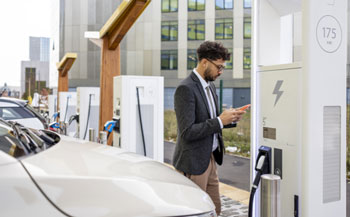Driving a greener future for transport with electric vehicle charging qualifications
How the right skills solutions can take electric vehicle adoption to the next level.
24 September 2024

The adoption of electric vehicles (EVs) is driving demand for skilled professionals capable of installing EV charge points or maintaining hydrogen fuel cell vehicles. To meet this growing need, effective skills development will be vital – both for those already working in key sectors and for the workforce of future.
Working in partnership with colleges and training providers worldwide, at City & Guilds we develop and deliver EV charging training to equip the electrical industry with skills that support a decarbonised future for the automotive sector, creating new opportunities for electricians and the providers who train them.
The significance of EV charging infrastructure: Paving the way for a sustainable tomorrow
 Widespread electric vehicle adoption won’t be possible without the introduction of more robust charging infrastructure. EV demand is skyrocketing and the need for widely available charging points and stations is rapidly becoming evident. According to the Society of Motor Manufacturers and Traders, in 2022 there was only one charge point installed for every 53 electric cars purchased and the resulting lack of convenience creates a significant barrier for consumers. Drivers have consistently cited the lack of fast charging options available in the areas they drive in as being a key factor in their decision as to whether to buy an electric car, making more widespread use of electric cars unlikely until more robust charging provision exists.
Widespread electric vehicle adoption won’t be possible without the introduction of more robust charging infrastructure. EV demand is skyrocketing and the need for widely available charging points and stations is rapidly becoming evident. According to the Society of Motor Manufacturers and Traders, in 2022 there was only one charge point installed for every 53 electric cars purchased and the resulting lack of convenience creates a significant barrier for consumers. Drivers have consistently cited the lack of fast charging options available in the areas they drive in as being a key factor in their decision as to whether to buy an electric car, making more widespread use of electric cars unlikely until more robust charging provision exists.
Electricians able to safely design, install and maintain the charging network are integral to creating a reliable UK EV charging infrastructure. This creates significant career opportunities for electrical professionals but also requires the development of a new set of skills specific to EV charging. For training providers catering to electricians and the electrical sector, offering qualifications that focus on these skills is a vital way to meet industry demand and be part of building a more sustainable society.
City & Guilds' EV Charging Design and Installation qualifications: Empowering electricians for the future
While this is a huge opportunity for electrical professionals it’s also crucial that everyone working on EV charge points has the correct knowledge and skills to work safely.
As part of a 2022 roundtable Luke Osborne of the Electrical Contractors’ Association spoke about the value of having trained, knowledgeable installers: ‘Even though in most circumstances it’s just a straightforward radio circuit, there are specific nuances when it comes to electric vehicle charge points, so it’s really important that electricians and installers understand these particulars.’
Following robust engagement with the sector and with the advice from industry experts, City & Guilds developed an industry-standard consisting of three qualifications:
- 2921-31 Design and installation of domestic and small commercial electric vehicle charging installations.
- 2921-32 Design and Quality Assurance of Largescale electric vehicle charging installations.
- 2921-33 Installation and maintenance of Largescale electric vehicle charging installations.
These programmes were designed to provide the required knowledge and expertise for electricians, electrical engineers and/or installers intending to design, install and maintain EV charging points safely, efficiently and reliably across domestic settings and public and large-scale commercial locations, providing UK drivers and road users with a trustworthy and first-class EV charging network.
Launch of new 2921-34 domestic and small commercial charging installation programme
This has since been followed by the launch of a new and enhanced qualification for domestic and small commercial charge point installations. Aligned with the latest industry standards and mapped to the NOS (National Occupational Standards) and the Electrician Plus model, 2921-34 Design and Installation of Domestic and Small commercial electric vehicle charging installation is available from September 2024 and will take the place of 2921-31 when it becomes unavailable in October 2024.
Collaborative Approach: Powering up the Future with Skills
With the future of the planet on the agenda and our transport systems at the centre of the push for decarbonisation, governments, industries, workers and training and assessment organisations need to work together to find the right solutions. At City & Guilds we want to play our part by bringing the expertise and influence we have developed in the electrical sector to help provide the skills that electrical professionals and employers need.
We spoke to electricians across the UK to understand their view of the demand for new skills and to confirm the importance of consistency and certification for anyone involved in charge point installations.
We also hosted a roundtable discussion with representatives from multiple key players in the electrical and automotive industries including the Office for Zero Emission Vehicles, the Electrical Contractors Association, Connected Kerb Ltd and Shell Mobility Network to help us to find out more about the emerging skills gaps and the training needs of the workforce.
Training electricians for the development of a reliable EV charging infrastructure can provide huge benefits to individual drivers and to society. Working with expert training providers to create a greener world while simultaneously supporting the creation of new job opportunities in the electrical sector is something we are very proud to be involved in.
The Road Ahead
Andy Moss, Managing Director at City & Guilds highlighted the importance of collaboration for tackling climate change, saying “We are talking about a national challenge, a national opportunity, that means we've all got to come together - training providers, further education colleges, private training providers, awarding organisations and employers - all working together to ensure that we're equipping ourselves as a country with the skills that are needed to make this transition turn a cleaner, brighter future.”
Skills have a vital role to play in the electrification revolution and we are pleased to be part of the crucial partnership between training providers and the professionals and industries they support as we prepare for a more sustainable future.
Find out more about our EV charging qualifications